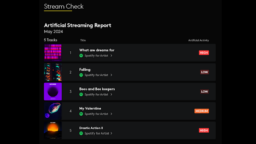On this episode of the Music Business Worldwide podcast, MBW founder Tim Ingham is joined by Rasty Turek.
Turek is the founder and CEO of Pex – which, amongst other things, tracks and analyzes copyrighted content on digital services.
According to Pex’s tech, over a million tracks on audio streaming services like Spotify, Apple Music, and TIDAL present a headache for music rightsholders.
These million-plus tracks are what Pex calls “modified audio” – which means an original track has been sped up, slowed down, or otherwise manipulated, and then uploaded as an entirely new recording.
The main issue for the music industry? Unless these million-plus tracks have legally licensed the original recording on which they’re based, they’re infringing copyright.
More than that, they’re pulling royalties away from the original artists in question.
Pex has provided several examples of ‘sped up’ tracks on audio streaming platforms that aren’t attributed to a recording’s original artist.
There’s a version of Halsey‘s Without Me, for example, with over 6 million streams on Spotify. There’s also a modified version of Coldplay and The Chainsmokers’ Something Just Like This that has over 12 million plays.
It’s not hard to find more: MBW took a cursory search through Spotify before recording this and discovered a sped-up version of Justin Bieber and Nicki Minaj’s Beauty and a Beat with over 8 million streams, and a sped-up version of Lady Gaga’s Bloody Mary with over 25 million streams.
In all of these cases, the credited artist on each track – and therefore, presumably the artist account collecting royalties – is not the original artist in question.

As you can hear in our interview with Pex’s Rasty Turek, he thinks this is an industry failing – and something of a sibling to streaming fraud.
Listen in full above, or read an edited/abridged version of the podcast discussion below…
We’ve heard a lot about streaming fraud recently, especially within the discussion around so-called artist-centric royalty models. How does what you have found out fit within that conversation?
Rasty Turek: Quantifying [it as] fraud is a little bit strong for me, because I find this to be a part of the environment. [Someone who takes a song] and speeds it up, because they find pleasure, enjoyment in it, I don’t think that’s a fraud. I think that’s the creativity of humans, as in any other part of the world. So I will not quantify it as a fraud.
That said, especially in [an] artist-centric world where the artist is paid based on how they’re played, not properly attributing all of their contents… it’s damaging to the artist.
From our research, at least 1% of all music has some kind of modified audio, and the existing systems are not catching that up. So that means at least 1% of all music is misattributed and misappropriated in that sense. And… this means a lot of artists are essentially mis-paid [given how much] they are played.
When you say that at least 1% of plays on audio DSPs – we’re talking about Spotify, Apple Music, Amazon Music, etc. – are misattributed, that’s a significant amount of money that’s being diverted away from legitimate rights holders, whether for naive reasons or otherwise. That’s certainly how I would see it if I were, for example, Universal Music Group.
I see it the same way. I think fraud requires a purpose to deceive. I don’t think anyone does it – or most people don’t do it for that reason.
We follow all sorts of services, from DSPs to UGCs, and this is fairly prevalent, and there is huge following of people trying to essentially enjoy content like this. Nightcore mixes, and so on. And I do think that there is a legitimate seed to the movement. If people enjoy this kind of music, they should absolutely have access to it.
But at the same time, proper attribution should be required. And this is much more up to the platforms and services than it is up to the artist to essentially go and fish out.
What people might find shocking about your numbers, more than anything else, is that we’re not talking about UGC platforms, but super-legit streaming platforms. And all of these tracks have to go through some kind of distribution middleman.
In the current world, the distributors generally do the absolute minimum to verify, because the platforms themselves don’t put any pressure on them to do any better. So even at 1% – while the number, the final numbers [are] huge [at] tens of millions of dollars – it’s still much smaller than the overall market.
And so I think the platforms approach it as a kind of low [importance] problem and they generally don’t focus on it.
However, that shifts when you look at [alternative] payment models. Once you start focusing on the artist-centric model, then things change very significantly because now you are explicitly excluding some payouts to legitimate artists.
A similar issue [exists with] with MLC, the Mechanical Licensing Collective in the United States, and other [such] services, because they have no easy way to make this identification [because they] deal with metadata that is being submitted to them. So the composers, the writers are essentially even more, I would say, removed from that payout.
Where do you, in the first instance, lay the blame for this problem? It seems to be a distributor problem. Pex has the technology to identify this stuff, and the takeaway that I’m getting from Pex’s messaging is that distributors don’t have the technology to do this effectively, and that’s why it’s ending up on the DSPs.
Blame is, again, a strong word, but I do think that this starts explicitly from the platform, from the DSP.
If Spotify showed up and said, ‘I don’t care what kind of technology you have [or don’t have], this is required and you will be held accountable,’ [the distributors] would adjust.
“In the current world, the distributors generally do the absolute minimum to verify, because the platforms themselves don’t put any pressure on them to do any better.”
Rasty Turek, Pex
The distributors do what the platforms require them to do. It’s not that they every day think about, like, ‘How could I scheme my way around this?’ They try to run [a] legitimate business and do exactly what they’re asked to comply [with].
The platforms, on the other hand, are the ones that are making payouts [and should] be ultimately responsible for quality control. I don’t care if you’re using a DSP or you have a direct relationship with a user, like YouTube does. It’s your choice. It’s your business model, it’s your choice and you are responsible for making sure the content is properly attributed.
As part of its changes to its royalty payout model, Spotify is going to financially penalize distributors who it can prove have been benefiting from streaming fraud. Would you encourage a DSP like Spotify to actually extend that and look to penalize – whether financially or otherwise – distributors who are caught uploading modified tracks whereby the due royalties aren’t actually going back to the true rights holders?
I usually prefer the approach of honey [rather] than the stick. And I do believe that both distributors and the DSPs are in the same boat… They want content to be [released] to the audience and they want the best for the artist. I don’t think anyone wakes up and says ‘How could I scam everyone, and how could I [rip money off from] people… I think they’re really trying to do their best job.
And I do think that this is a matter of motivation. If [the DSPs] say , look, we’re shifting models, and it’s going to benefit your artist greatly to utilize technologies like these, because not only we will catch what we didn’t [catch] before, but [the money goes to your artist]. Your artist’s content gets sped up regardless who [released it]. It eventually gets paid properly back to you. It benefits everyone in the process.
“This is going to become a fairly significant portion of the experience, and so maybe within the next few years, we [will] see up to 10% of content [being] in some form or shape modified.”
Rasty Turek, Pex
And so I don’t think Spotify needs to run around and essentially point fingers [at] distributors, saying ‘It’s your fault, it’s your fault. And you are now going to pay me this,’ or something. I think they can easily just say ‘Look, this is a win-win situation.’
And we can all make this a better experience for both the artist and eventually the listener, because the listener now gets proper attribution metadata.
So that means when you’re looking [for a] Taylor Swift song, and you want to hear it sped up, you know exactly where to look. You don’t have to make up who knows what kind of queries to search, you don’t have to be part of these kinds of culture somewhere deep in Reddit or somewhere else where you are fishing out the songs, you can explicitly find it because it’s a legitimate piece of content.
The most popular track on TikTok this year across all music is a song called Cupid by Korean girl group Fifty Fifty. But it’s actually the Cupid “twin version”, a sped-up version. When you go to find that on Spotify, it does actually seem to be attributed back to their label in Korea. So there doesn’t seem to be an issue there. It seems to be a cultural phenomenon that people want to manipulate audio, and find an audience for that, as you point out, as a positive act of fandom. I can’t see it slowing down as a trend.
I cannot see that either, and obviously sped up and slowed down is one layer of modification. [There is also] AI voices and [other trends] and they’re all contributing to this, and I don’t have any exact numbers because I cannot read the future, but it does point to a significant increase… from the fandom perspective, but also because it’s so easy, right? The tools are now very available. One can really easily download a song, speed it up, or change certain parts of it and return it back to the service.
So this is going to become a fairly significant portion of the experience, and so maybe within the next few years, we [will] see up to 10% of content [being] in some form or shape modified.
In [a] music industry that is trending towards $80 billion annually, that will be [a] fairly significant amount of money shifted that way from legitimate artists to someone else. And ultimately, that’s what we’re talking about here. Whose pockets are going to be lined with his money?
“The audience should always be as satisfied as possible. So instead of trying to remove content or block content of [a] certain size or certain type, we should absolutely help to create it, if that’s what the audience desires, but also attribute it back correctly to the right person.”
Rasty Turek, Pex
One of the unfortunate truths of the music industry is essentially [that] what cannot be attributed properly gets distributed based on market share to black boxes, especially the publishing side.
And so that means someone else is getting your money. And so this definitely needs to start shifting, especially as artist-centric models are becoming now commonplace and are dominating…
And so my hope is that, again, this will be [a] rather positive incentive to all, to adopt the tools and services that essentially help them to properly attribute the content, and eventually this will become part of the experience, because who doesn’t want that for their audience?
The audience should always be as satisfied as possible. So instead of trying to remove content or block content of [a] certain size or a certain type, we should absolutely help to create it, if that’s what the audience desires, but also attribute it back correctly to the right person.
Are you hopeful that motivations are coming together here to fix this kind of issue? Do you think it’s kind of inevitable that this problem will get fixed?
We clearly have the technology right now – I am very biased, obviously, I’ve got this company – but we provably have the technology to solve this. I’m pretty sure we are not going to be the only ones. And so this is not a technical problem. This is purely a matter of incentives.
So if someone in the process – and that someone should preferably be the DSP – starts going after this problem, then it will be solved.
[This is not like] AI voice generation, because that is a very difficult and very different technical problem. This is not a difficult technical problem.
And so I do believe [that] everything in the past points out that eventually all problems that grow to a certain size get solved if the technology is available and possible. I believe that this one will be solved as well.
MBW’s podcasts are supported by Voly Entertainment. Voly’s platform enables music industry professionals from all sectors to manage a tour’s budgets, forecasts, track expenses, approve invoices and make payments 24/7, 365 days a year. For more information and to sign up to a free trial of the platform, visit VolyEntertainment.com.





